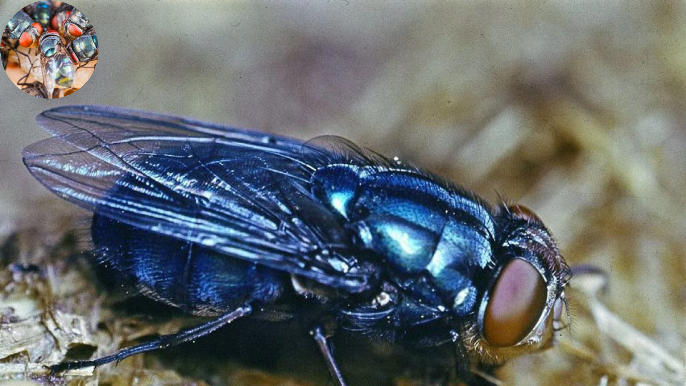Bluebottle flies, with their striking metallic blue bodies and loud buzzing, are more than just a household nuisance-they are often a warning sign of underlying sanitation issues. Attracted to decaying organic matter such as garbage, pet waste, or even dead animals, these flies can invade homes and multiply if not addressed promptly. Not only are they unsightly, but their presence can also indicate potential health risks, as they are known to carry and transmit various pathogens. Understanding what draws bluebottle flies indoors and how to eliminate their breeding grounds is the first step toward reclaiming a clean, fly-free living space.
Understanding the Life Cycle of Bluebottle Flies
Bluebottle flies, also known as blowflies, have a fascinating life cycle. It begins when a female lays eggs in decaying organic matter, such as food scraps or animal remains, making your home an attractive target.
Once the eggs hatch, they emerge as larvae known as maggots. These maggots feed voraciously on the decomposing material around them. Within a few days, they grow quickly and prepare for their next stage.
After feeding, the maggots find a suitable location to pupate. During this phase, they undergo metamorphosis inside protective casings called puparia.
Within one to two weeks, adult bluebottle flies emerge from these pupae. They are often mistaken for houseflies but can be distinguished by their vibrant blue-green metallic color.
Understanding this life cycle is crucial for effective control strategies against infestations in your space.
Common Areas Where Bluebottle Flies are Found in Homes
Bluebottle flies often invade spaces where food is present. Kitchens are a prime target, especially near open waste bins or forgotten leftovers.
Bathrooms can also attract these pests, particularly if standing water is damp. They thrive in moist environments, making cluttered countertops and sinks potential breeding grounds.
Living rooms aren’t exempt, either. Open windows may invite blue bottles inside, drawn by scent from nearby kitchens or gardens.
Outdoor areas adjacent to your home can also be hotspots. Neglected trash cans or compost heaps provide perfect conditions for their reproduction.
Attics and basements might seem unlikely places for these flies, but if organic matter accumulates unnoticed, they can harbor them. Keeping an eye on these areas is essential to preventing infestations.
You may also read (are house flies really that big).
Tips for Preventing Bluebottle Flies in Your Home
To keep bluebottle flies at bay, start by maintaining a clean environment. Wipe down surfaces regularly and store food securely.
Proper waste disposal is essential. Rubbish, especially organic matter, should be placed in covered bins, which should be emptied frequently to avoid attracting unwanted pests.
Check for any entry points around your home. Seal cracks in windows, doors, or walls to block access to these pesky insects.
Keep your outdoor spaces tidy as well. Trim overgrown vegetation and remove standing water where flies might breed.
Consider using natural deterrents like essential oils. Diluted peppermint or eucalyptus can be effective when sprayed around the house.
Try keeping fruit in the fridge instead of on counters; this simple change can significantly reduce fly attraction!
Natural Remedies for Getting Rid of Bluebottle Flies
Natural remedies can effectively tackle blue bottle flies without resorting to harsh chemicals. One popular option is the use of essential oils. Citronella, eucalyptus, and peppermint oil are known for their fly-repelling properties. Mix a few drops with water in a spray bottle and mist around your home.
Fill a bowl with apple cider vinegar, cover it tightly with plastic wrap, and poke small holes on top. The sweet smell attracts the flies while preventing them from escaping.
Also, consider planting herbs that deter these pests. Basil, lavender, and marigold can be natural rep placed near doors or windows.
Regular cleaning is crucial. Keeping surfaces free of food residue helps eliminate potential breeding grounds for bluebottle flies.
Chemical Solutions for Eliminating Bluebottle Flies
Chemical solutions can be effective when tackling blue bottle flies, but they should be used with caution. Various insecticides designed for flying insects are available in the UK. Always opt for products labeled specifically for use against flies.
Before applying any chemicals, read the instructions carefully. Ensure you follow safety precautions and keep pets and children away from treated areas.
Sprays can provide instant relief as they kill on contact. However, residual sprays offer longer-lasting protection by creating a barrier that deters new pests.
Consider using fly baits or traps containing attractants mixed with an insecticide. These can lure bluebottle flies into a fatal trap while minimizing exposure in your home environment.
Using these methods responsibly will help balance effective pest control and household safety.
Professional Pest Control Services for Severe Infestations
If your home is experiencing a severe infestation of blue bottle flies, it may be time to consider professional pest control services. These experts have the knowledge and tools to tackle significant fly problems effectively. They can assess the situation in your home, identify breeding sites, and implement targeted strategies tailored to eliminating these pests.
Pest control professionals use various methods often unavailable to general consumers. This includes advanced traps, insecticides, and sanitation techniques specifically designed to break the life cycle of bluebottles. Additionally, they will provide valuable advice on maintaining a fly-free environment once the problem is under control.
Investing in professional help could save you time and effort while thoroughly eradicating blue bottle flies from your living space. With their expertise, you’ll likely see effective results faster than if you tried DIY solutions alone. Don’t let these pesky insects disrupt your comfort at home—consider bringing in specialists who can restore peace quickly and efficiently.
You may also read (why do midges appear in your house).

